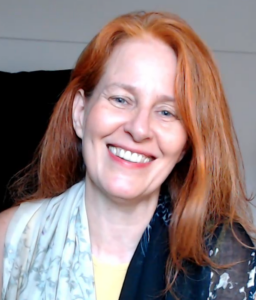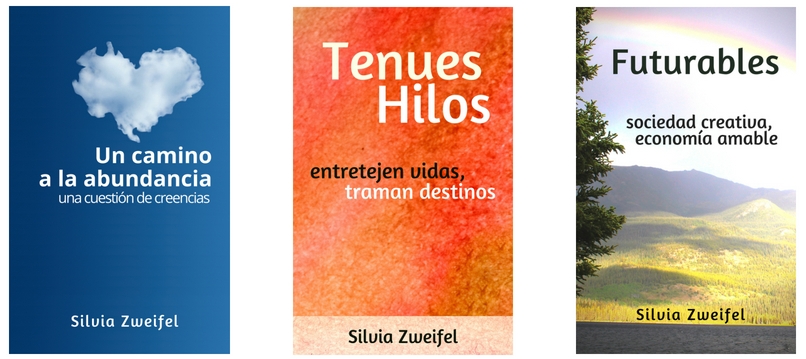Here some highlights of my bio related to the search for an inclusive, life-sustaining Economía AMABLE

My connection to abundance is rooted in my childhood. I grew up in an area covered with subtropical forests in which vegetation was very alive, where my family lived on a farm immersed in that vibrant nature. My mother was an inspiring example because of her sense of abundance, joy and loving care for the animals, plants and things in our surrounding.
At the age of 17 I left to study economics at an University where I became familiar with the idea of scarcity, and discarded my own experiences of abundance. Once graduated I developed my professional career in the banking industry where I worked for 17 years: a period during which I firsthand learned how the economy and the financial system work.
Performing at a bank involved a combination of an overall overview on the economy and specific activities dynamics profiling numerous companies. Caring for business portfolios and overseeing credit risks gave access to witness how the foundational concepts of an economy based on scarcity combined with a linear approach to producing-distributing-consuming operate. An economy conceived with a fragmented materialistic approach that continues even when humanity is already moving into a knowledge-learning based society which allows replacing scarcity with abundance.
In 2001/2002 a huge financial crisis hit the country and many banks were upside down. As a result the one I was working for was sold. Knowing I would not fit into the incoming organizational culture I left to deepen my understanding about sustainability by engaging in nature conservancy, only to confirm that it was taken seriously by a minority. For this reason I left for a sabbatical to reflect on the issue, omnivorously reading and writing while studying narrative. Three books resulted of an extended retreat:
“UN CAMINO A LA ABUNDANCIA, una cuestión de creencias” (A Path to Abundance, a matter of beliefs) which considers sustainability from a systems approach. It was presented in November 2007 as a key component of the Initiative “CUIDAMOS LA VIDA, CONSERVANDO NATURALEZA” (We care for life by taking care of nature) fostered by Fundación Hábitat & Desarrollo. But at the time the country was immersed in a climate of high sociopolitical conflict.
Friends of mine who lived in a conservancy area in Uruguay invited me to stay at their home on the shore of Laguna de Rocha for some 60 days during their absence. In practice it was a retreat in solitude and silence since communication with outsiders rarely happened. A second essay resulted using that environment as a frame to share experiences, reflections and queries under the title: “TENUES HILOS entretejen vidas, traman destinos” (SUBTLE THREADS interweave lives, forging destinies)
Back in Buenos Aires I actively engaged in the systems thinking community and also was invited as a columnist at a radio program designed to cover a diverse subjects ranging from economy to astrobiology. That lead me to a next book using the program as a frame to weave experiences with conceptual queries and developments under the title: “FUTURABLES sociedad creativa, economía amable” (FUTURABLES, creative society, economía amable).

Searching for tools to promote systemic innovation, particularly to foster an Economía AMABLE: a life sustaining amiable economy I took opportunities to deeply explore the “Banathy Conversation Methodology” by participating in research events held Ushuaia (Southern Argentina) and Linz (Austria) which resulted in coauthoring an article on the subject, that followed by a continue search for shorter versions of it, easier to convey and prepare for a deep exploration through the BCM which requires an extended process and an immersion aiming to promote new understanding and knowledge of complex issues.
In the process I also got involved in the longevity movement. A trend I addressed it in my first book aiming to understand the worldwide systemic change, being this one highly disregarded in its true potential, usually addressed from a traditional depreciative perspective. This promising trend hints on the key value of using a prospective anticipatory approach to navigate the world of growing complexity we live in.
Most of the ones who inspired and informed my search and research are systems scientists/thinkers: Charles François, Fritjof Capra, Basarab Nicolescu, Edgar Morin, Humberto Maturana among others; Psicologists such as Abraham Maslow, Carl Gustav Jung and Robert Johnson; Ruth Benedict (anthropologist), Ana María Bovo (oral narrative) and Juan Carlos Gambarota (nature conservancy); novelists and other artists such as: Isabel Allende; Gabriel García Márquez; Mario Vargas Llosa; Daniel Quinn; Alejandro Jodorowsky; Gustav Klimt; spiritual scriptures such as the Mahabharata.
Here a short studies resumé: Graduate in economy (Universidad Nacional del Nordeste); postgraduate studies in non for profit organizations management (Universidad de San Andrés and Universidad Torcuato Di Tella); Diplomat in complex pedagogy (Multiversidad Mundo Real/Edgar Morin); Systems thinking at GESI under the mentorship of Prof. Charles François. Narrative thinking and acting at Casa de Letras under the guidance of Ana María Bovo.
